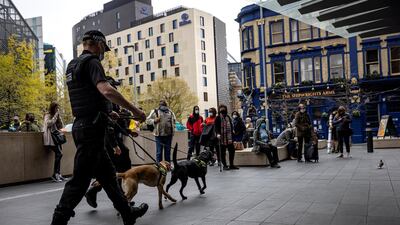The end of the coronavirus lockdown in the UK could allow terrorists to strike against public transport, an insurer said.
A risk assessment said transport centres would be among the first places where people would gather again, making easy targets for extremists.
Analysts at Pool Reinsurance said the risk of a post-lockdown attack could be heightened by financial pressures on counter-terrorism services.
They warned of extremists who might have been radicalised during the pandemic or delayed terrorist plans because of the coronavirus.
"Terrorists who have been unable to conduct mass casualty attacks during lockdowns may execute these plans once restrictions lift," they said.
The report said that a successful attack could further postpone the economic recovery from the coronavirus by triggering public anxiety about travelling.
Analysts said security services should pay attention not only to well-fortified sites in urban areas but to less obvious targets in the suburbs.
“Public transport networks present the opportunity to strike simultaneously at the general population and critical national infrastructure,” the report said.
"Attacks can generate significant public anxiety, undermine confidence in the ability of government to provide security, and cause widespread economic and societal disruption.
“This is of particular importance in the current situation where transport will be integral to the post-Covid economic recovery.”
Range of terrorist threats as lockdown is lifted
Matt Twist, a senior Metropolitan Police counter-terrorism officer, urged people this week to be vigilant against terrorism as they resume more normal lives.
"As the crowded places which have traditionally been the target for terrorists start to fill with people again, there is always the potential for that risk to come back," he said.
Mr Twist said extremist groups, especially on the far right, used coronavirus conspiracy theories to attract young supporters.
Meanwhile, the Pool Reinsurance report said the main threat of mass casualty attacks came from Islamist extremists.
In Britain’s worst terrorist attack on public transport, 52 people were killed when suicide bombers attacked buses and trains in London in 2005.
In 2017, a bomb partially exploded on a London Underground train in an incident which injured dozens.
The risk assessment said dissident Irish republicans could carry out disruptive attacks but were less likely to inflict mass casualties.
Potential terrorists were most likely to use low-tech methods, such as knives, because such attacks were easy to plan and hard to prevent, it said.
For most extremists there has been a “shift towards using more rudimentary methods” in attacks on public transport, the report said.
"This is probably a result of low-complexity attacks being easier for terrorists to plan undetected when compared with more sophisticated methodologies such as explosives."
The UK’s coronavirus lockdown sparked fears that young and vulnerable people were at risk of being drawn into terrorism.
Social distancing measures meant that teachers and social workers were less likely to spot signs of radicalisation, police said last year.
In February, a mother whose son was killed in the 2017 Manchester Arena attack said she feared extremists would be able to target young people.
"It is not just violent Islamists that commit crimes like that, it's extreme right-wing people, too, and now a lot of people are at home terrorist recruiters on both sides are having rich pickings in trying to target young people," Figen Murray said.


